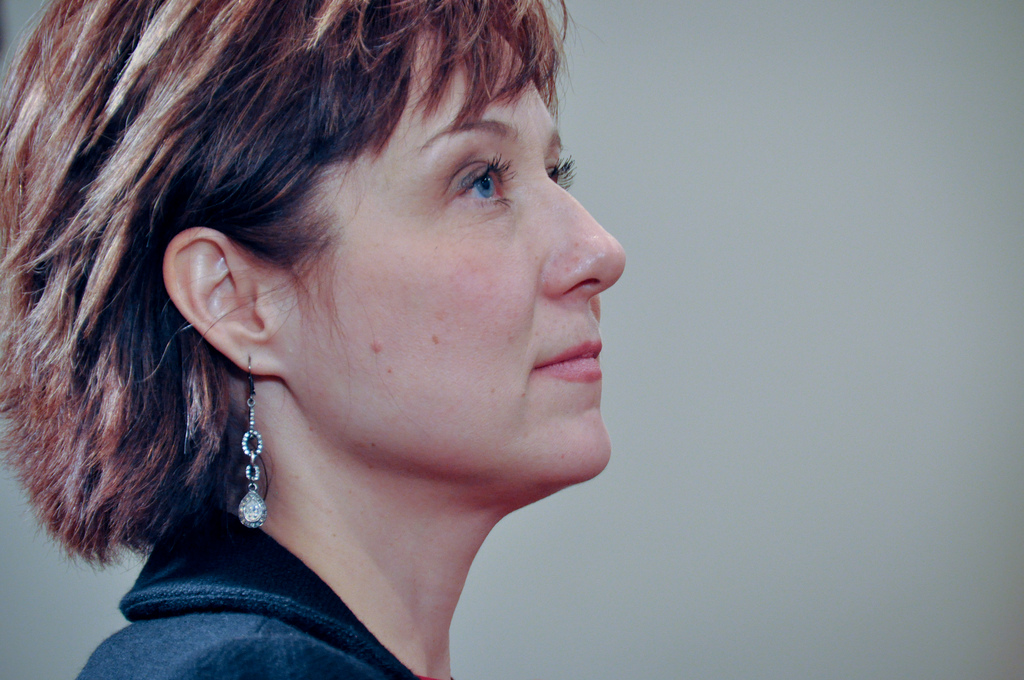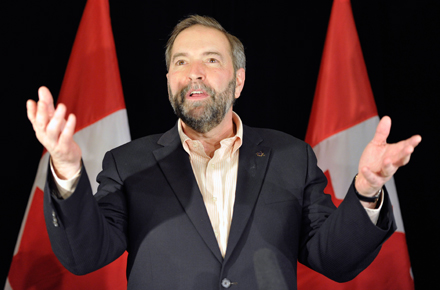Thomas Mulcair was elected leader of the New Democrats just a few short weeks ago and so far, he has had a two-fold strategy: to appear closer to the mainstream centre than most would have characterized the NDP in the past, and to hold NDP gains in Quebec by speaking to that province’s issues often to the expense of growth for his party in the rest of Canada.
For Mulcair, support of the radical student movement in Quebec is definitely not in his strategic interests. The majority of Quebecers do not support the nightly protests in Montreal and few believe the protesters are primarily motivated by access to education. The student protest phenomenon in Quebec is neither representative of mainstream values nor of Quebec as a people.
Therefore, cracks in his caucus showing support for student demos in Quebec should cause the NDP leader concern. It is not yet clear if he has roped in his caucus and staff or if he will continue to let them show their true colours.
For example, here is NDP MP Dany Morin’s recent Facebook profile picture:

A story about Morin’s support was written in Le Quotidien,
The MP for Chicoutimi-Le Fjord Dany Morin supports students from the University of Quebec at Chicoutimi (UQAC) in their fight against rising tuition fees. On a personal level, however, while the New Democratic Party (NDP) for now refuses to interfere in the matter.
Dany Morin participated in the campaign “Me and my red square” of the Movement of General Student Associations UQAC (MAGE-UQAC), this week. He has been photographed with red square emblem adopted by the student movement in its fight against rising tuition fees announced by the Government of Quebec.
What about NDP MP Pierre-Luc Dusseault?
A press release on his website states,
The member for Sherbrooke Pierre-Luc Dusseault gives his support to the student movement of November 10 and will attend the event in Montreal this afternoon.
“It is essential to maintain and improve access to postsecondary education as students request today,” said Dusseault, who was studying political science at the University of Sherbrooke before his election on May 2nd, “What we try for Quebec has served for decades as a model for other educational systems elsewhere in Canada,” said the member for Sherbrooke.
Here’s another release from Dusseault after rioting occurs in conjunction with student demos in Quebec,
I wish to express my support to the will of students and students who demonstrate today in Sherbrooke to improve their financial situation and accessibility to university. As MP for Sherbrooke, I can assure you that the New Democratic Party supports your legitimate claims and requires the federal government to act, in accordance with the jurisdiction of the Quebec government to mitigate the increase tuition.
Here was NDP MP Alexandre Boulerice’s Facebook profile picture for a while,

NDP MP Anne Minh Thu Quach wrote on her Facebook,
During the demonstration outside the Valleyfield College this morning. I spoke out in solidarity for the right to accessible education, respect for law strike and the respect for democracy.
With students at the College this morning! Beautiful energy!Anne Minh Thu Quach: Despite the cold, several students campaigned passionately that morning for the right to education available! Congratulations to all! They will stand all morning at the College this week! Encourage them if you can! Bring your drums and make them dance to keep warm! 😉
Anne Minh Quach: Thu @ Rosh: Thanks for the praise. I act according to my values and my ideals. Several NDP MPs also support students in their approach. Moreover, we have a deputy spokesman in post-secondary education in Quebec. This is Matthew Dube. It also advocates the creation of a federal transfer to provinces and territories that would target post-secondary education in order to provide affordable access to students. @ Louis Charles: That, in compliance with federal and provincial powers. Much like it is already healthy.
Anne Minh Thu Quach: This is a matter of political choice and social choice. I believe that there is a more just, equitable and socially rewarding for supporting our education system in making it a simple product consumption.
And what about Thomas Mulcair, how is he handling this issue in his province in balance with being a national leader? And how is our national media covering the issue and how the NDP caucus is reacting to it?
The CBC, um, reports,
May 23, 2012
Earlier this spring, the Ottawa media was at pains to find any federal MP interested in saying much about either the policies or the politics driving the mass student protests across Quebec.
Opposition Leader Tom Mulcair, whose party represents the majority of Quebec’s federal seats (including several held by student-aged MPs), brushed off questions, saying the student tuition battle was “first and foremost a matter of provincial jurisdiction.”
(With yesterday’s intervention — and now funding, too — from labour groups outside Quebec, it will be interesting to watch the NDP generally and Mulcair specifically walk this fine line on the dispute, especially with the leader’s own personal history as a former Charest cabinet minister.)




